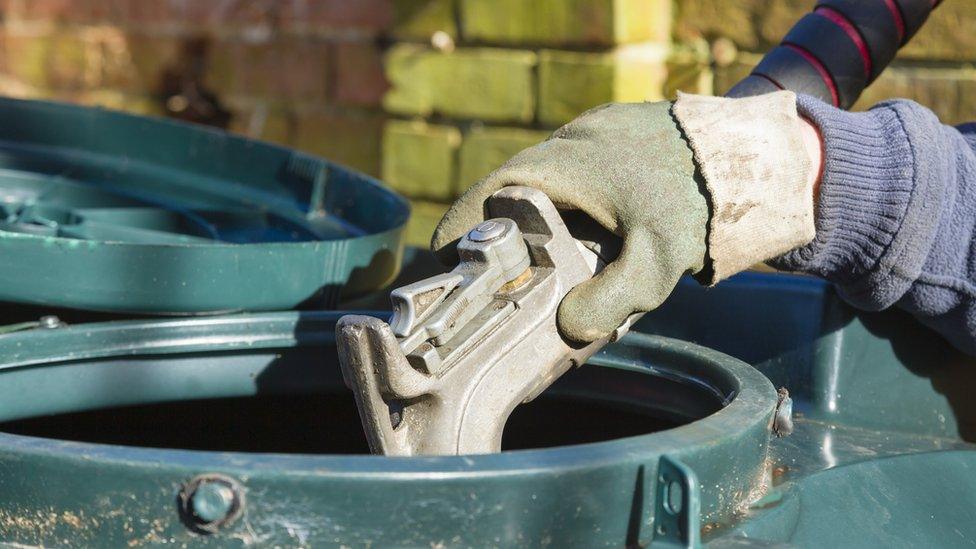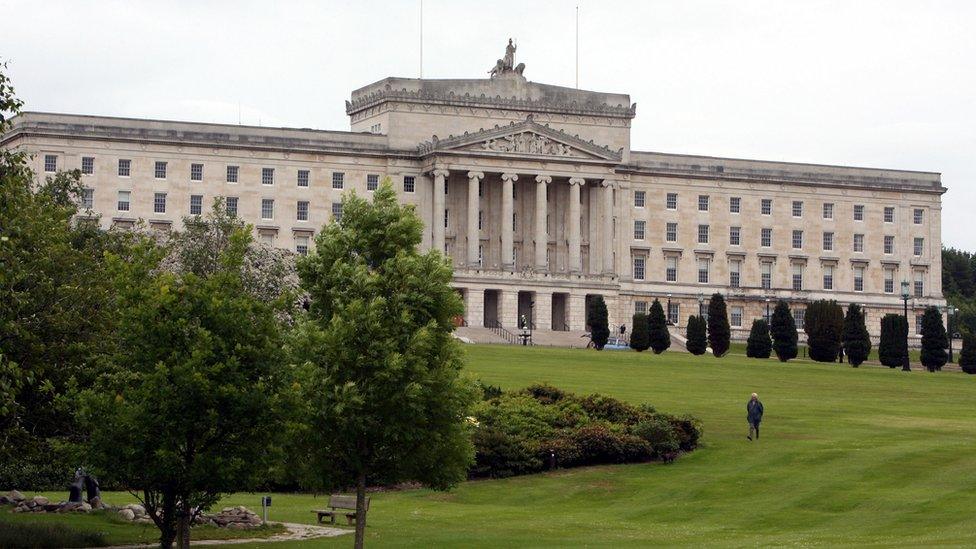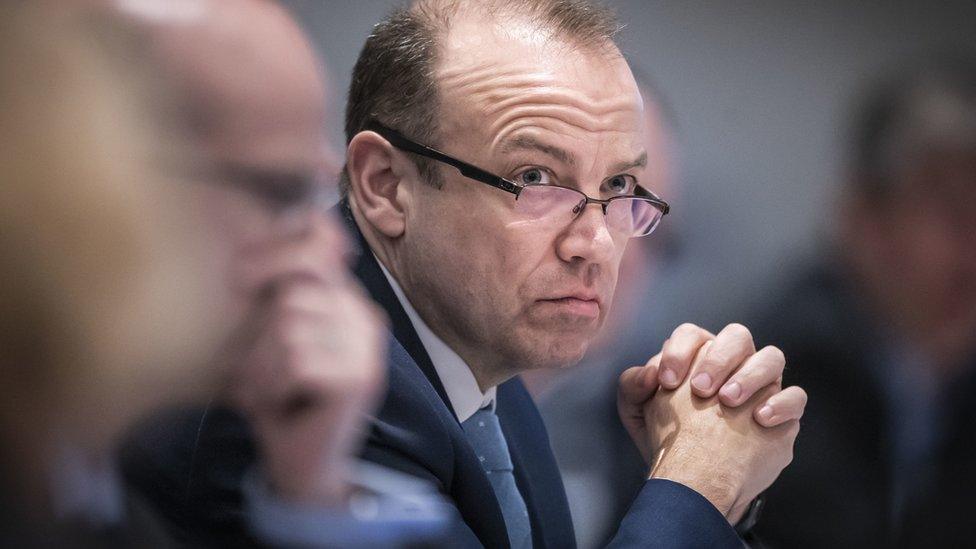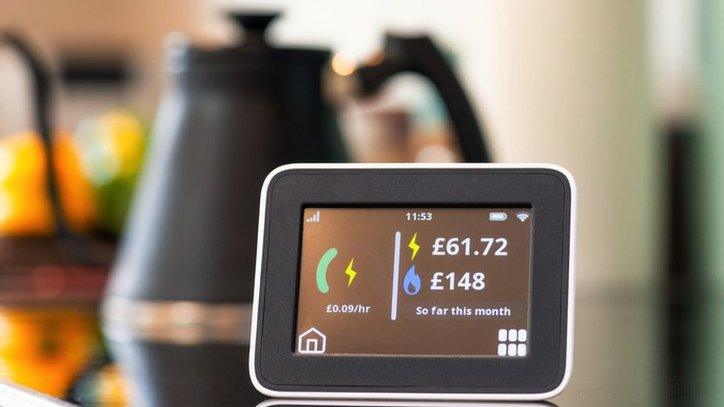Cost of living: Could a sitting Stormont help with energy bills?
- Published

Many households in Northern Ireland are bracing themselves for a difficult winter as the cost-of-living crisis continues.
The UK government has introduced some extra financial support.
The devolved executive at Stormont has not functioned since February, with some parties saying that if it was restored, more help could be delivered across Northern Ireland.
What has the UK government done to help?
First of all, Northern Ireland has a different energy market to the rest of the UK, with its own rules and regulator.
But an energy price cap introduced by then Prime Minister Liz Truss's government to limit gas and electricity prices will take effect in Northern Ireland from November, with support due to be backdated for October's bills to match help already in place in Great Britain.
That won't, however, help people who use oil. Currently more than two-thirds of homes in Northern Ireland rely on oil heating.

Last month the government confirmed there would be a £100 payment, in the form of a credit to electricity bills, to help oil customers and those who use coal and biomass as their main heating fuel.
However, it is not yet clear when the £100 will be paid, with the government so far only referring to "this winter".
What else has been promised?
All households in Northern Ireland are waiting on a £400 discount off electricity bills - but details of when exactly this will be delivered are vague at best.
Former Prime Minister Liz Truss promised it would be issued in November.

Unlike in Great Britain, politicians in Northern Ireland have said when it arrives here it will go to most households as a one-off payment, instead of instalments.
But then Northern Ireland Secretary Chris Heaton-Harris told a Westminster committee he could not commit to a definitive date by next month and said having an executive in place would make it easier to deliver the discount.
The decision on whether it will be a one-off payment has still not been signed off.
The government has said that legislation to force landlords to pass on the £400 discount to tennants whose bills are included in the rent will apply in Northern Ireland.
A spokesperson for the UK Department for Business, Energy and Industrial Strategy said: "The UK Government is working at pace to deliver a solution for the Northern Ireland market which ensures all households receive the £400 discount on their energy bills as soon as possible, offering the same level of support as households in the rest of Great Britain.
"We are also working with electricity suppliers to explore how the £100 payment for those who use alternative fuels can be paid.
"Details of how this scheme will run for Northern Ireland will be announced in the coming weeks, including how customers on prepayment meters will receive the discount."
What is the Sinn Féin view?
It is at loggerheads over how much assistance a devolved government could provide.
Sinn Fein's Finance Minister Conor Murphy has suggested that if an executive had been in place, equivalent funding from London for the £400 discount would have already been allocated by the Department of Finance and distributed into a scheme.
Mr Murphy has also pointed to a pot of about £270m previously issued to Stormont from the Treasury, which he insists could be used to help tackle cost of living issues, but not without approval from a sitting executive.
He has repeatedly laid blame for that on the Democratic Unionist Party (DUP), which is refusing to nominate a deputy first minister to a power-sharing government because of its opposition to the Northern Ireland Protocol.
What is the DUP view?
It points to the massive financial interventions made by the Treasury during the Covid pandemic to help with furlough payments, and other supports that were carried out directly from Westminster.
Stormont's Democratic Unionist Party (DUP) Economy Minister Gordon Lyons has argued that energy bill support was promised on a "UK-wide basis", and that it is right it is delivered directly by London.

The NI secretary has vowed to call another assembly election if Stormont is not back by 00:01 on Friday
His DUP colleague Sammy Wilson has in recent weeks also attacked Sinn Fein's position on claims around help that could be provided from Stormont's end.
He said if an executive was to be restored, the majority of unallocated funds would be required to cover shortfalls in the budgets of departments and could not be used to tackle energy bills.
What do other parties say?
The Alliance Party submitted a petition to recall the assembly, saying it was "reckless and irresponsible" to have no executive in the midst of a cost of living crisis.
The Social Democratic and Labour Party (SDLP) also wants the executive back up and running, saying it was "unconscionable" that "that hundreds of millions of pounds can sit unspent at Stormont when people go without support".
And the Ulster Unionist Party has called for the DUP to nominate a deputy first minister, saying the "easiest and most logical way" for Stormont money to be allocated is through a functioning executive.
Who is right?
While the parties are unsurprisingly not singing from the same the hymn sheet, both arguments are merited in different ways.
Having an executive up and running would give parties, as well as ministers and their departments, full oversight of spending decisions and in theory, could allow for some Northern Ireland-specific schemes to be developed in due course.
But there would follow questions which Stormont department would take ownership of the various support mechanisms.
And others point to problems experienced with Covid grant schemes set up by Stormont during the pandemic.
Before the executive collapsed, Stormont parties had previously agreed they would prioritise funding for reform of the health service, and it is likely there would be similar calls for the lion's share of unspent money to be allocated there.
What happens if Stormont does not return?
The chances of an executive being in place by Friday, the current deadline for restoring devolution, are slim to none.
At that moment caretaker ministers who have remained in post, such as Conor Murphy and Gordon Lyons will cease to hold office and civil servants will be left keeping things ticking over.
The Northern Ireland secretary has said he will then pass a budget for Northern Ireland via Westminster, and provide departmental permanent secretaries with extra powers, in the absence of local ministers.

NI Secretary Chris Heaton-Harris kept his job in the latest cabinet reshuffle
At that stage it's most likely that the currently unspent funds would be allocated but the secretary of state could choose what the money should go towards.
It's unclear if there's a ready-to-go scheme which would allow civil servants to quickly get money to people.
Chris Heaton-Harris has also vowed to call another assembly election if Stormont is not back by 00:01 on Friday.
If that happens, departments and civil servants at Stormont would need to abide by election guidance and maintain a low-key presence during the campaign.
Then there is the recent warning from Mr Murphy that Stormont faces a £660m overspend unless action is taken.
He blamed it on the impact of inflation and the lack of a functioning executive.
Given the difficult financial situation, Treasury officials may not be willing to provide any more support than has already been promised, in the event Stormont remains in cold storage this winter.
- Published19 October 2022

- Published1 October 2022

- Published23 November 2023

- Published26 October 2022

